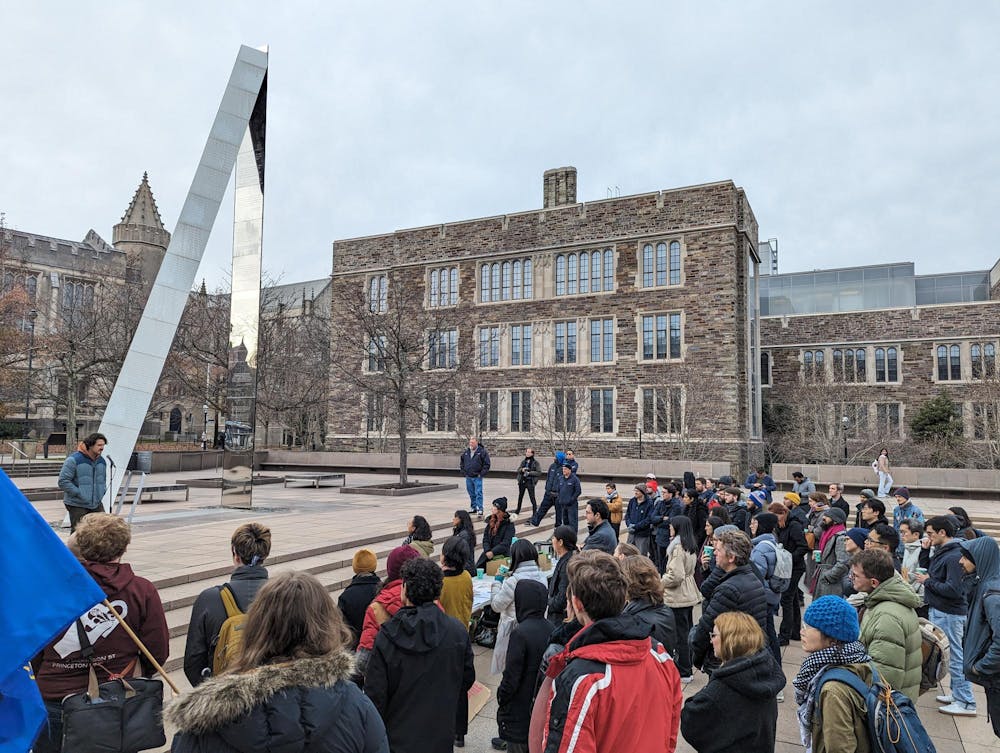Members of the Princeton University Postdocs and Scholars-United Auto Workers (PUPS-UAW) union and representatives from the University attempted to have their second bargaining session on Tuesday, Nov. 12. However, in a series of events reminiscent of last week’s bargaining session, negotiations halted after new disputes on whether observers would be allowed to attend the negotiations.
Postdoc Lacy Feigh, a member of the bargaining committee, along with Hanna Ehrlich, an observer and postdoc union member, said that the night before the session began, the bargaining committee notified the University that they did not plan to bring more observers than could fit in the negotiating room. On the day of the meeting, University representatives refused to enter the room due to the number of observers, instead requesting that none be present. The bargaining committee offered a cap of 10 observers, which led the University to counter with a cap of five.
“It felt like a power play,” Ehrlich said.
Feigh and another member of the bargaining committee presented the University with a petition — with over 170 signatures — explaining that they wanted open bargaining for purposes of transparency and democracy. Feigh told The Daily Princetonian that the postdocs “really wanted to get to come to an agreement to start bargaining.”
The bargaining committee then proposed a cap of seven observers. When 30 minutes were left of the three hour-long bargaining session, University representatives told the bargaining committee via email that they still insisted on the five-observer cap. The union did not agree to meet this cap, and, as a result, no bargaining proceeded.
In a statement to the ‘Prince,’ University Spokesperson Jennifer Morrill wrote that the University and PUPS-UAW “have not been able to agree on the number of observers or the parameters regarding observers. While there is no legal right to have observers in bargaining sessions, the University has agreed to consider observers as an attempt to compromise.”
“There was seemingly no rationale for why five and not 10 observers,” Feigh said, saying that it seemed “quite arbitrary.”
Morrill did not comment on the University’s specific request for five observers, repeating the University has “agreed to consider observers as an attempt to compromise,” while emphasizing that there is no legal obligation to include observers.

As stated on the PUPS-UAW website, the union aims to give the postdocs improvements regarding “salary, compensation, appointments, housing, access, transportation, access to wellness resources, increased benefits, workplace rights and protections, workplace support, and union rights and security,” according to Feigh.
Although Feigh and Ehrlich acknowledged that negotiating ground rules regarding observers is not legally mandated, Ehrlich said that these types of “ground rules” are what they feel is an “industry standard and relatively reasonable.” Feigh added that management refusing to leave their caucus room to talk with the union “just doesn’t seem like something a professional institution does.”
Feigh mentioned that she was a graduate student at the University of Pennsylvania, where bargaining negotiations with the graduate student union are concurrently underway.
“[Penn has] no issues with observers in the room, and so seeing that process play out just down the road, 50 miles away at a peer institution, and seeing Princeton’s real insistence on limiting having its own employees in the room to witness this process is just really confusing, I think, to many of us,” Feigh said. “We’ve moved quite significantly, and it seems like they’re just unwilling to meet us anywhere reasonable.”

“What might Princeton be hiding, right?” Ehrlich asked. “What do they not want to see shared among postdocs?”
Morrill wrote to the ‘Prince’ that “The University has proposed using the Federal Mediation and Conciliation Service (at no cost for either party) to assist the parties and remains willing to pursue this option.” The Federal Mediation and Conciliation Service is an independent government agency that provides services in resolving labor-management disputes, including collective bargaining mediation.
Feigh and Ehrlich said that the union’s priority between now and the next bargaining session is to try to continue to negotiate the “ground rules,” including establishing a number of agreed-upon observers.
Efforts were made to prevent the dispute over observers that took place Tuesday. Morrill wrote that an attempt to negotiate ground rules did occur after the previous session which saw a similar breakdown over rules regarding observers.
“Between meetings, the University and PUPS-UAW exchanged additional proposals regarding ground rules for negotiations, including proposals regarding observers,” Morrill wrote, but added that an agreement was not able to be reached.
The next bargaining session will be in three weeks, on Tuesday, Dec. 3.
Editor’s note: This story’s lede was updated to more clearly reflect the circumstances of Tuesday’s meeting.
Meghana Veldhuis is an assistant News editor for the ‘Prince.’ She is from Bergen County, N.J. and typically covers faculty and graduate students.
Nikki Han is a News contributor for the ‘Prince.’
Please send any corrections to corrections[at]dailyprincetonian.com.








